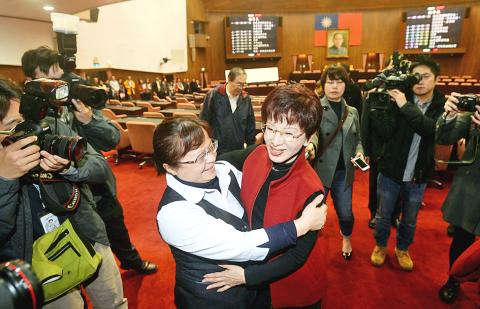Deputy Legislative Speaker Hung Hsiu-chu (洪秀柱) made her last tour in the Legislative Yuan yesterday, with the new legislature set to convene tomorrow.
Hung, whose 26-year-long career as a legislator is coming to an end, said goodbye to the staff at the Legislative Yuan compound.
Hung said that she was 40 when she first walked into the Legislative Yuan and has since “contributed her most productive and mature years to the institution.”

Photo: Lin Cheng-kung, Taipei Times
Seeing that many of her former classmates have retired from their respective careers, Hung said she felt she should retire as well.
Although Hung said she was retiring, she picked up a registration form to run in the chairpersonship by-election for the Chinese Nationalist Party (KMT).
When asked by the reporters to comment on a rumor about a “Hung-blocking” plan within the KMT, Hung said: “I do not care about it and I do not feel [that such a plan is at work]; maybe I am a bit slow.”
She said there are only comrades and no enemies within the party. There might be different points of views, but what is important is to make one’s ideas clear, she added.
“One must maintain a healthy mind. Taking in stride when facing this kind of [defeated] atmosphere and having our comrades and society better understand [our views] is what we have to do,” Hung said.
Regarding concerns that the KMT could follow in the footsteps of the New Party if Hung is elected as party chairperson, Hung said that the worries were unnecessary, adding that party members could have a clearer and common goal through discussion.
She rejected a description of the by-election as a “local versus non-local,” race, as former New Taipei city councilor Chen Ming-yih (陳明義), who dropped out of the race on Friday, described it.
Hung said that she does not believe that it is so and if the by-election is seen that way from the outside, she would break that image.
Hung lauded KMT Acting Chairperson Huang Min-hui’s (黃敏惠) decision to run, saying it is not a light responsibility as the party is at its nadir and as the next chairperson’s term would be one-and--a-half years long.

Alain Robert, known as the "French Spider-Man," praised Alex Honnold as exceptionally well-prepared after the US climber completed a free solo ascent of Taipei 101 yesterday. Robert said Honnold's ascent of the 508m-tall skyscraper in just more than one-and-a-half hours without using safety ropes or equipment was a remarkable achievement. "This is my life," he said in an interview conducted in French, adding that he liked the feeling of being "on the edge of danger." The 63-year-old Frenchman climbed Taipei 101 using ropes in December 2004, taking about four hours to reach the top. On a one-to-10 scale of difficulty, Robert said Taipei 101

Nipah virus infection is to be officially listed as a category 5 notifiable infectious disease in Taiwan in March, while clinical treatment guidelines are being formulated, the Centers for Disease Control (CDC) said yesterday. With Nipah infections being reported in other countries and considering its relatively high fatality rate, the centers on Jan. 16 announced that it would be listed as a notifiable infectious disease to bolster the nation’s systematic early warning system and increase public awareness, the CDC said. Bangladesh reported four fatal cases last year in separate districts, with three linked to raw date palm sap consumption, CDC Epidemic Intelligence

US climber Alex Honnold left Taiwan this morning a day after completing a free-solo ascent of Taipei 101, a feat that drew cheers from onlookers and gained widespread international attention. Honnold yesterday scaled the 101-story skyscraper without a rope or safety harness. The climb — the highest urban free-solo ascent ever attempted — took just more than 90 minutes and was streamed live on Netflix. It was covered by major international news outlets including CNN, the New York Times, the Guardian and the Wall Street Journal. As Honnold prepared to leave Taiwan today, he attracted a crowd when he and his wife, Sanni,

Taiwanese and US defense groups are collaborating to introduce deployable, semi-autonomous manufacturing systems for drones and components in a boost to the nation’s supply chain resilience. Taiwan’s G-Tech Optroelectronics Corp subsidiary GTOC and the US’ Aerkomm Inc on Friday announced an agreement with fellow US-based Firestorm Lab to adopt the latter’s xCell, a technology featuring 3D printers fitted in 6.1m container units. The systems enable aerial platforms and parts to be produced in high volumes from dispersed nodes capable of rapid redeployment, to minimize the risk of enemy strikes and to meet field requirements, they said. Firestorm chief technology officer Ian Muceus said